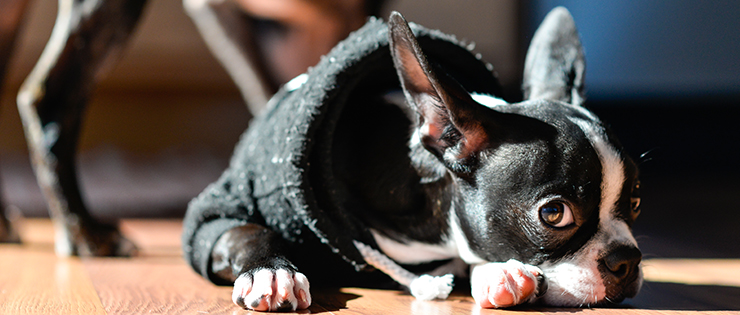
As I write this to you, it is a cold and rainy morning. The maximum temperature for today is 9 degrees and overnight, it will get down to 1 degree Celsius. Whilst our pets may have fur coats, there can be no doubt that dogs, cats, guinea pigs, rabbits and pet rodents feel the cold. In fact any animal that is endothermic (regulates their core body temperature) will suffer if left outside over the cold winter months.
I have three dogs and a cat. All of them sleep inside no matter what the temperature is outside, because comfort for a pet is not just about being warm enough. It is about them feeling part of the family. Certainly, some of you have horses, who naturally can't reside in your bedroom, or perhaps you have working dogs, who can't practically all cuddle up on the lounge. There are always instances in which having your pet sleep alongside you is impractical. So, it is important that anyone who has an animal, understands the reasons why maintaining a constant core body temperature is essential, and what can happen over winter if this is not provided.
Why maintaining a constant core body temperature is essential
1. Endothermic animals with fur become colder, faster, if they are wet. This is because their body covering cannot trap heat effectively
2. In weather below 15 degrees Celsius, these animals can lose up to 65 % of their body heat, meaning they have to work much harder to stay warm. For young as well as older pets, this can compromise their health severely.
3. If your pet is outside and their bed is not elevated off the floor, their body temperature may drop and they can become hypothermic.
4. Hypothermia can kill your pet. Thousands of pets die of hypothermia each year.
5. Cold pets especially dogs, can develop a range of annoying behaviours if left outside in the cold. Barking excessively and digging the yard to create a 'warmer' nest are not uncommon. These perceivably irritating behaviours are usually a means of your dog communicating that they are uncomfortable, and even suffering.
6. With winter comes thunderstorms, that can have an emotional impact of your dog. In windy and stormy weather, your dog should always be kept indoors with you.
Tips to consider
Whether your pet is indoors or outside, there are several factors to consider, to ensure that you give them the best chance of surviving the winter comfortably. Here are some pointers to think about:
• always try to allow your pet to sleep inside and have access to indoors 24 hours a day.
• insulating coats can assist in maintaining body warmth
• elevating beds and ensuring that kennels or containers are insulated and weatherproof
• install a pet door for your dog or cat to come inside if they are cold
• pet rodents, guinea pigs and rabbits should NOT be kept outdoors over winter
• if your pet is wet, ensure you dry them and prevent them for being in the rain under all circumstances.
Some of my clients do argue that dogs have fur coats and that wolves sleep outside. The issue I draw here is that dogs are not wolves. Dogs are domesticated animals that rely on humans for their physical and emotional wellbeing. Most dogs will choose to be inside if they have the option. It is really about giving your pet the choice. If your dog chooses to sleep outdoors, then that is of their volition. If they prefer that, then that is what is best for them. In terms of dogs having fur coats, most dogs have selectively bred fur, that is not designed for its insulation. Therefore, most dogs get cold. Huskies, maremmas and malamutes are an exception, but even then, some of these dogs may prefer to sleep inside because of the emotional value of being at your side.
Life with dogs
At the end of the day, giving your dog choice in life is important. Dogs in particular are intelligent animals and have been domesticated to exist by our side. When we take an animal into our lives, we accept responsibility for that animal. They do not have a voice or a choice on what happens to them. That is up to us. So, ask your pet what they need from you. If they tell you that they'd prefer to lie under the stars each night, make sure that your yard is set up for their safety and wellbeing. If your pets are anything like mine, they will choose to be tucked in this winter, alongside you. You are after all the best friend they have.